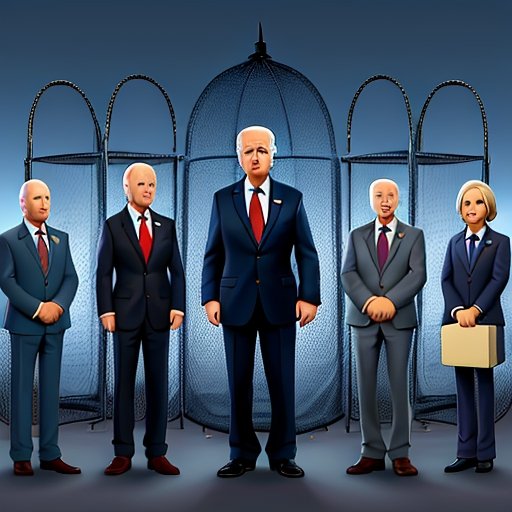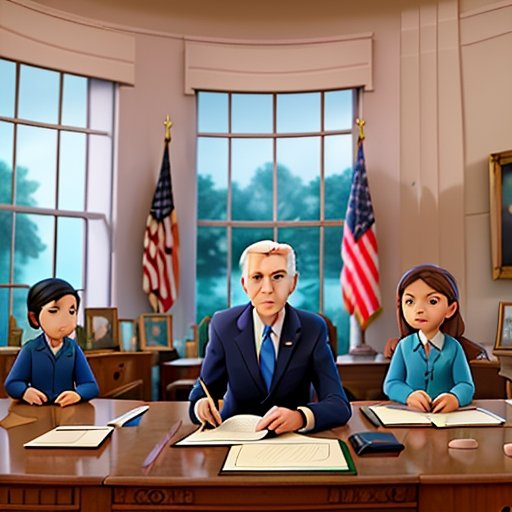With less than a month until Election Day, Vice President Kamala Harris finds herself in a precarious position, facing increasing pressure to clarify what distinguishes her potential presidency from that of President Joe Biden. This dilemma became all too evident when she appeared on ABC’s “The View” and struggled to articulate a clear departure from Biden’s approach to leadership. When asked how she would lead differently than Biden, she replied, “We’re obviously two different people” and “I will bring those sensibilities to how I lead.” Yet, when pressed to name a specific decision she would have made differently, she simply couldn’t do it, admitting, “There is not a thing that comes to mind.” Telling, isn’t it?
To be fair, Harris is in a tight spot. She’s trying to walk a fine line between loyalty to Biden and the need to carve out her own identity as a leader. It’s a balancing act that’s been historically difficult for any vice president aiming for the top job. The problem is, when the public hears her say she can’t think of anything she’d do differently than Biden, they don’t hear loyalty; they hear a lack of vision.
The Harris Dilemma
It’s no secret that Kamala Harris’ policies are essentially the same as Joe Biden’s. After all, she was his partner in crafting and promoting his legislative agenda, from infrastructure investments to prescription drug cost reductions. Those are her fingerprints on those policies just as much as his. Harris can’t run away from the Biden legacy because she helped build it.
This dynamic isn’t just about policy; it’s about political survival. A public break from Biden might come off as opportunistic—like she’s turning her back on the very administration that put her in the spotlight. Her aides know this, and so does Harris. Yet, the crux of the issue is that loyalty to Biden doesn’t resonate well with voters who view his presidency as lukewarm at best. According to recent polls, Biden’s favorability ratings are still underwater, with only about 4 in 10 Americans holding a favorable view of him. Compare that with Harris’ slightly warmer numbers, and it’s clear she has more to lose than gain by standing too close to Biden.
Same Policies, Different Wrapping
Let’s get to the core of why Harris’ policies look so similar to Biden’s—they are, by design, aligned. Even the distinctions she tries to introduce feel like echoes of the same tune. For example, she recently suggested a smaller hike to the capital gains tax than Biden’s plan proposed. It’s a deviation, sure, but not exactly a bold stroke of independence. The Biden administration quickly adopted her position, reinforcing the perception that any so-called differences between them are superficial at best.
Let’s consider Harris’ approach to border security and immigration. She has often emphasized the importance of treating migrants with dignity and addressing the root causes of immigration, such as poverty and violence in their home countries. However, despite her rhetoric, she hasn’t significantly deviated from Biden’s stance on this issue, which critics argue has led to a more permissive border policy. While Biden’s administration has faced criticism for its handling of the border, often accused of effectively opening the gates wider than before, Harris has not put forth any concrete measures that would tighten border security or establish stricter controls. When she talks about immigration, it’s less about laying out a new vision and more about doubling down on a policy that some see as allowing in just about anyone.
Nothing Comes to Mind? Disqualifying
Kamala Harris’ reluctance to publicly disagree with Biden isn’t just about loyalty; it’s a tactical decision. In a time of global crises and domestic challenges, she’s wary of appearing divided from her boss, especially on foreign policy issues. Her team argues that showing daylight between her and Biden could be reckless and make her seem inconsistent. However, this caution comes at a steep price, painting her as a candidate of the status quo, rather than the change agent as she wants to be seen.
This strategy has left Harris vulnerable to attacks from both sides. Trump, never one to miss an opportunity, quickly seized on her comments from “The View,” playing them at a rally to uproarious applause. His critique was pointed: “Her answer that she would do nothing different is disqualifying.” Even Republican strategists noted that her message, or lack thereof, handed Trump a gift-wrapped talking point.
The Burden of Biden’s Shadow
Harris’ biggest obstacle isn’t just her inability to define how she’d be different from Biden; it’s that she hasn’t made a compelling case for why voters should believe she can be different. Simply saying, “I’m not Joe Biden” doesn’t cut it when she can’t point to any substantial differences in policy or leadership approach. Her loyalty to Biden, while admirable, makes it difficult for her to stand as a symbol of change in an election where many voters are hungry for something new.
The reality is, Kamala Harris has been a central partner in Biden’s presidency, and their policy goals are intertwined. From healthcare reforms to climate initiatives, Harris’ vision aligns closely with Biden’s agenda, leaving little room for her to pivot without appearing disingenuous. This alignment might help her among die-hard Democrats, but it leaves a gaping hole for undecided voters who want a fresh start, not a continuation of the past four years.
Conclusion
Kamala Harris’ predicament is not an easy one. She’s caught in a classic political bind: staying too close to Biden risks alienating voters who want change, while distancing herself risks looking like a fair-weather partner, only loyal when it suits her ambitions. But for someone who wants to lead the country, not just serve as a caretaker of Biden’s legacy, she needs to do more than just talk about her biography and age difference.
She needs to articulate a vision that doesn’t just echo Biden’s policies with a younger face and fresher word salads. Until she can convincingly answer the question of what she’d do differently, Harris will remain firmly tethered to Biden’s political fate. And in a race where even the perception of sameness can be a disqualifying factor, that could be a deal breaker.
If Kamala Harris wants to stand out as a leader in her own right, she’ll need to find a way to respect her loyalty to Biden while still showcasing her capacity to lead in a new direction. It’s not enough to simply be the vice president who isn’t Joe Biden; to become president she must first become the candidate who is Kamala Harris, with her own vision and her own path forward. And until she does, her candidacy will remain inextricably linked to a presidency that many see as running out of steam.
Maybe, though, she’s already shown us all the vision she has to offer.






